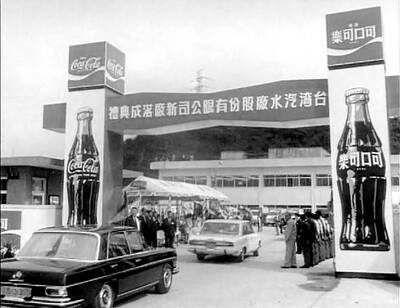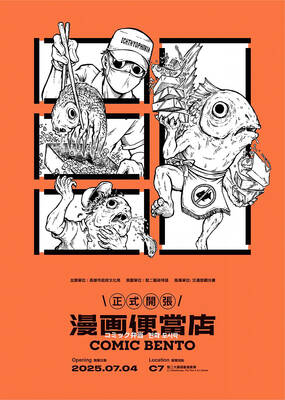In 1978, Harvey Milk, gay activist and San Francisco city supervisor, was shot to death along with mayor George Moscone by fellow supervisor Dan White. Thirty years later, Gus van Sant’s much-anticipated Milk told the story of the late politician, considered by many to be the modern gay movement’s first martyr. The movie garnered widespread critical acclaim, with Sean Penn winning his second Oscar for playing the role of Milk.
But fewer people are familiar with accomplished documentary maker Rob Epstein’s 1984 film The Times of Harvey Milk, an Oscar-winning documentary that served as the blueprint for Van Sant’s feature.
The two-week long mini retrospective on Epstein currently showing at SPOT — Taipei Film House presents four award-winning documentary works by the American director, an artist known for raising mainstream awareness about gay-related issues through his polished, non-fictional films.
Epstein takes the audience on a journey through Milk’s life, a chronicle suffused with poignant emotion. A project that began before Milk was murdered, The Times of Harvey Milk, composed of exclusive documentary and archival footage, combines original interviews with news reports to create a gripping work that extends its gaze far beyond the specifics of Milk’s life. Set in the volatile political and social climate of 1970s San Francisco, the film depicts Milk as an everyday man who chose to speak out on behalf of both his own community and other minorities. Epstein juxtaposes Milk’s rise and demise with the career of White, a man supposedly representative of the “old-fashioned values that built this country.”
Much of the film’s emotional urgency stems from the testimonies of Milk’s friends and associates. Particularly resonant interviews center on the exaltation Milk and his allies experienced after their successful campaign to bar Proposition 6, the proposed California ordinance prohibiting homosexuals from teaching in public schools. The immense impact that Milk’s subsequent death had on the gay community is reflected in both images of the candlelight procession on the night of the murders and the severity of the riots that followed White’s lenient sentence (White was paroled after serving less than six years for his conviction of voluntary manslaughter).
Recounted with equally strong emotion and blessed with similarly distinctive characters, the Oscar-winning Common Threads: Stories from the Quilt (1989) documents the first decade of the American HIV epidemic through the eyes of five individuals featured on the AIDS Memorial Quilt. Narrated by Dustin Hoffmann, the film appeals to more mainstream audiences, bolstered by its high production value and smooth narrative flow.
The stories that the film follows are immensely compelling. As the five interviewees speak of their experiences watching their loved ones die of AIDS, these oral histories are punctuated by news reports criticizing governmental inertia, as well as accounts of the public fear and hysteria that surrounded the disease. The footage is well edited and progresses towards a tear-inducing climax. In addition to its sentimental impact, the film holds historical value, as first-person witness accounts provide future generations with vital lessons from the not-so-distant past.
Epstein and filmmaker Jeffrey Friedman shift their focus to a lesser-known atrocity in the movie Paragraph 175 (2000), the title of which refers to a statute that once prohibited homosexuality in Third Reich Germany. Narrated by actor Rupert Everett, the film draws upon the testimonies of six survivors of the Nazi persecution of homosexuals, a purge that resulted in both the condemnation of approximately 10,000 to 15,000 to concentration camps and the arrest of 100,000.
The reluctance of the elderly interviewees to speak is as telling as their words. In an emotional outburst, one survivor recounts a Nazi experiment so horrific that it still makes him bleed every day. Another recalls “the singing forest,” a name that alludes to the locale where gay men subjected to torture wailed and screamed. No less disturbing is German historian Klaus Muller’s comment that, despite growing up in Germany, he never heard about the mass persecution of gays.
The most entertaining and enjoyable of the four films, The Celluloid Closet (1995) delivers a comprehensive review of the ways in which gays and lesbians have been represented in Hollywood cinema. The work ingeniously juxtaposes clips from various movies to construct a persuasive argument about the evolution of homosexual imagery through the cinematic medium, as films ranging from 1912’s Algie, the Miner to 1993’s Philadelphia are re-examined. In elegantly tracing the progression of the homosexual onscreen image, The Celluloid Closet follows the development of the gay archetype from the effeminate laughable sissy to the evil villain or vamp to the pitiful wretch to, finally, real-life characters.
The well-executed film is fun to watch, adorned with witty opinions from gay and straight celebrities alike, including Tom Hanks, Whoopi Goldberg, Susan Sarandon, Tony Curtis and Harvey Fierstein. One highlight is writer Gore Vidal’s hilarious account of his introduction of the gay character Masala in the 1959 epic movie Ben Hur.

July 28 to Aug. 3 Former president Chiang Kai-shek (蔣介石) reportedly maintained a simple diet and preferred to drink warm water — but one indulgence he enjoyed was a banned drink: Coca-Cola. Although a Coca-Cola plant was built in Taiwan in 1957, It was only allowed to sell to the US military and other American agencies. However, Chiang’s aides recall procuring the soft drink at US military exchange stores, and there’s also records of the Presidential Office ordering in bulk from Hong Kong. By the 1960s, it wasn’t difficult for those with means or connections to obtain Coca-Cola from the

Taiwan is today going to participate in a world-first experiment in democracy. Twenty-four Chinese Nationalist Party (KMT) lawmakers will face a recall vote, with the results determining if they keep their jobs. Some recalls look safe for the incumbents, other lawmakers appear heading for a fall and many could go either way. Predictions on the outcome vary widely, which is unsurprising — this is the first time worldwide a mass recall has ever been attempted at the national level. Even meteorologists are unclear what will happen. As this paper reported, the interactions between tropical storms Francisco and Com-May could lead to

It looks like a restaurant — but it’s food for the mind. Kaohsiung’s Pier-2 Art Center is currently hosting Comic Bento (漫畫便當店), an immersive and quirky exhibition that spotlights Taiwanese comic and animation artists. The entire show is designed like a playful bento shop, where books, plushies and installations are laid out like food offerings — with a much deeper cultural bite. Visitors first enter what looks like a self-service restaurant. Comics, toys and merchandise are displayed buffet-style in trays typically used for lunch servings. Posters on the walls present each comic as a nutritional label for the stories and an ingredient

Fundamentally, this Saturday’s recall vote on 24 Chinese Nationalist Party (KMT) lawmakers is a democratic battle of wills between hardcore supporters of Taiwan sovereignty and the KMT incumbents’ core supporters. The recall campaigners have a key asset: clarity of purpose. Stripped to the core, their mission is to defend Taiwan’s sovereignty and democracy from the Chinese Communist Party (CCP). They understand a basic truth, the CCP is — in their own words — at war with Taiwan and Western democracies. Their “unrestricted warfare” campaign to undermine and destroy Taiwan from within is explicit, while simultaneously conducting rehearsals almost daily for invasion,